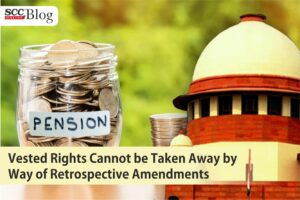Supreme Court: The bench of Ajay Rastogi and Abhay S. Oka, JJ has held that an amendment having retrospective operation which has the effect of taking away the benefit already available to the employee under the existing rule indeed would divest the employee from his vested or accrued rights and that being so, it would be held to be violative of the rights guaranteed under Articles 14 and 16 of the Constitution.
Factual Background
A Bank pension scheme was introduced by Punjab State Cooperative Agricultural Development Bank Limited, Chandigarh from 1st April 1989 and options were called from the employees and those who had given their option became member of the pension scheme and accordingly pension was continuously paid to them without fail and only in the year 2010, when the Bank failed in discharging its obligations, respondent employees approached the Punjab and Haryana High Court by filing the writ petitions. The Bank later on withdrawn the scheme of pension by deleting clause 15(ii) by an amendment dated 11th March, 2014 which was introduced with effect from 1st April, 1989.
Analysis
Considering the facts of the case, the Court noticed that the employees who availed the benefit of pension under the scheme, indeed their rights stood vested and accrued to them and any amendment to the contrary, which has been made with retrospective operation to take away the right accrued to the retired employee under the existing rule certainly is not only violative of Article 14 but also of Article 21 of the Constitution.
Explaining the distinction between the legitimate expectation and a vested/accrued right in favour of the employees, the Court observed that the rule which classifies such employee for promotional, seniority, age of retirement purposes undoubtedly operates on those who entered service before framing of the rules but it operates in futuro. In a sense, it governs the future right of seniority, promotion or age of retirement of those who are already in service.
The Court also explained by way of the following example,
“If a person while entering into service, has a legitimate expectation that as per the then existing scheme of rules, he may be considered for promotion after certain years of qualifying service or with the age of retirement which is being prescribed under the scheme of rules but at a later stage, if there is any amendment made either in the scheme of promotion or the age of superannuation, it may alter other conditions of service such scheme of rules operates in futuro. But at the same time, if the employee who had already been promoted or fixed in a particular pay scale, if that is being taken away by the impugned scheme of rules retrospectively, that certainly will take away the vested/accrued right of the incumbent which may not be permissible and may be violative of Article 14 and 16 of the Constitution.”
The Court also rejected the submission about the financial distress of the appellant Bank to justify the impugned amendment to say that it may not be possible to continue the grant of pension any more and observed that the rule making authority was presumed to know repercussions of the particular piece of subordinate legislation.
“Once the Bank took a conscious decision after taking permission from the Government of Punjab and Registrar, Co-operative, introduced the pension scheme with effect from 1st April 1989, it can be presumed that the competent authority was aware of the resources from where the funds are to be created for making payments to its retirees and merely because at a later point of time, it was unable to hold financial resources at its command to its retirees, would not be justified to withdraw the scheme retrospectively detrimental to the interests of the employees who not only became member of the scheme but received their pension regularly at least upto the year 2010 until the dispute arose between the parties and entered into litigation.”
The Court held that the non-availability of financial resources would not be a defence available to the appellant Bank in taking away the vested rights accrued to the employees that too when it is for their socio-economic security. It is an assurance that in their old age, their periodical payment towards pension shall remain assured.
“The pension which is being paid to them is not a bounty and it is for the appellant to divert the resources from where the funds can be made available to fulfil the rights of the employees in protecting the vested rights accrued in their favour.”
[Punjab State Cooperative Agricultural Development Bank Ltd v. Registrar, Cooperative Societies, 2022 SCC OnLine SC 28, decided on 11.01.2022]
*Judgment by: Justice Ajay Rastogi
Counsels
For petitioners: Senior Advocates Gurminder Singh and K.V.Viswanathan, AORs Niharika Ahluwalia and Shalini Kaul
For respondent: Senior Advocate P.S. Patwalia and AOR Siddharth

